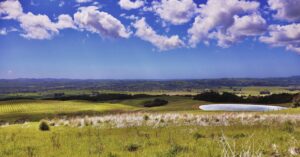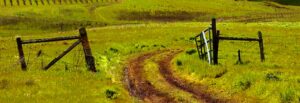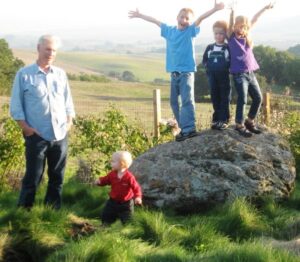
Mike Scott grew up on his family’s farm in Petaluma on the Western Slope of Sonoma Mountain. His father, Mark Scott, was one of the first to plant grapes at the higher elevation in the Petaluma Gap. Although his father doesn’t drink wine, he planted wine grapes because they were a higher-value crop that he figured would help make the farm more profitable. For years they have sold their grapes to Flowers, Sterling, Diageo and other award-winning wineries. But when Mike was a young man, Mark told him he had to leave the farm for a better life. So, Mike went off to college and then on to get a doctoral degree in Engineering. Today Mike is CEO of one of the fastest growing tech companies in Utah. He also bought the ranch, now called Six Gates, so that his father could retire, and they could keep the land in the family. Here’s their story.
Mark, your family has been in Petaluma for several generations; can you tell us when they first settled here and why they came?
Mark: My grandparents, on my mother and father’s side, immigrated to Penngrove and the Petaluma area in the early 1900’s from Norway (mother’s side) and Denmark (father’s side). In those days, only the oldest son inherited the family’s land, so, very often, the younger sons would come to America instead of staying in the poorer countries they were born in. I am descended from one of those younger sons who settled here in the Petaluma area, which, at the time, had a vibrant Scandinavian community. They were farmers in the old world so they did farming jobs here as well.
Mark: Was having a “family farm” a means to an end or was it the family’s central purpose?
Mark: The family farm has always been a means to an end, but it is also all we have known. The family is the most important part of a “family farm,” not the farm.
My grandfather on my father’s side originally leased a ranch on the western slope of Sonoma Mountain from the Hardin family (who bought the land from General Vallejo himself!). My father, Elmer Scott, was born on the kitchen table in the ranch home on that leased land. Later, my grandfather moved to Bodega Avenue in Petaluma and started a chicken farm, along with everybody else in those days! Unfortunately, it struggled during the depression so my father found work hoeing corn on dairy farms in the area, which is how he found his way into the dairy business. His dairy business became very successful and he eventually was able to buy the land his father leased on Sonoma Mountain along with several other adjacent ranches. It’s been in the family ever since. My father remained in the cattle business his entire life.
Was wine a part of family meals and celebrations?
Mark: Actually, no! We don’t have any family history with wine. Our family history is with the land, with working it and caring for it. My intent was always to care for the land, care for the fruit, and provide a consistent, quality crop and income for my family. I was never in this for wine.
Agriculture is such a big part of Petaluma’s history. How has it changed over the last fifty years?
Mark: When I was growing up in the 1950s and 1960s, agriculture was king in Petaluma and Sonoma County. It could be very lucrative on an individual basis. Agriculture made many people in the area much more wealthy than was typical in America at the time. It used to be the very center of the community.
As I said, my father continued buying cattle and ranches throughout his life. As time went on, however, it became more and more difficult to make a living off of agriculture in Sonoma County. Many cattle ranching families, like us, turned to vineyards in the 1990s and 2000s simply to keep family farms and ranches intact and pay the bills. It was a very pragmatic decision. That trend has continued to this day.
When was your vineyard planted? What inspired you to plant grapes? Was it a “leap of faith” that they would ripen?
Mark: Our family was among the first to plant vines in 1997, in what is now known as the Petaluma Gap. Because of the economic changes around ranching and agriculture, I was looking for other ways to make the land profitable and there was a “grape boom” in Sonoma County in the late 1990s. Our family was, I believe, the first or second family to plant a vineyard on the western side of Sonoma Mountain at elevation (not on the Petaluma Valley floor). It wasn’t clear to anybody at the time if vineyards would even work in that area, due to the cool climate and constant coastal breeze and fog! We were hopeful as we knew the land and the climate very well and picked some of the best pastureland on the ranch as the site for the vineyard. I was a third-generation farmer, so it didn’t feel like a “leap of faith”. It was a good economic opportunity, and I felt confident I could produce grapes on that land if anyone could. We also had a ten-year planting contract with a winery to help offset the risk. I had no idea that Sonoma County would become such an influential wine-producing region, and I never imagined the Petaluma Gap would become an AVA. I just wanted to use the land to support my family and continue our heritage.
economic opportunity, and I felt confident I could produce grapes on that land if anyone could. We also had a ten-year planting contract with a winery to help offset the risk. I had no idea that Sonoma County would become such an influential wine-producing region, and I never imagined the Petaluma Gap would become an AVA. I just wanted to use the land to support my family and continue our heritage.
Why did you name the vineyard “Six Gates?”
Mike: Like my dad said, this land has been in our family for generations. When I was young and working on the ranch, I often heard my grandfather (Mark’s father) tell stories about his life growing up on Sonoma Mountain. In those days, my grandfather’s parents were poor and didn’t have a car—they traveled to and from the ranch in a horse-drawn wagon. Fences separated all the fields and pastureland, with gates to let the wagons through. When my grandfather was young and he was riding with his father, it was his job to hop out of the wagon, open the gate, and then close it again after the wagon rode through. Then when I was a child, although things had changed and we were in a truck instead of a wagon, it was my job when I was riding with my father or grandfather to hop out and open the gates!
 There was a total of six gates that had to be opened to get from my grandfather’s farm to Petaluma to buy supplies in the 1920’s. So, I chose that name because it was a funny story I shared with my grandfather. And, it reminds me of him, my family heritage, our family’s connection to the land, and all the hard work and dedication that my ancestors went through to create the beautiful vineyard we now have there. My great-grandparents, my grandparents, and my parents all opened the gates for me, so to speak. The Six Gates name represents their dedication and pioneering spirit. I want to harness that heritage now that I am responsible for the land.
There was a total of six gates that had to be opened to get from my grandfather’s farm to Petaluma to buy supplies in the 1920’s. So, I chose that name because it was a funny story I shared with my grandfather. And, it reminds me of him, my family heritage, our family’s connection to the land, and all the hard work and dedication that my ancestors went through to create the beautiful vineyard we now have there. My great-grandparents, my grandparents, and my parents all opened the gates for me, so to speak. The Six Gates name represents their dedication and pioneering spirit. I want to harness that heritage now that I am responsible for the land.
Mike, when you were growing up your dad said “Don’t stay on the farm.” What was your reaction?
Well, I was not surprised as that was the consistent message throughout my life! My parents strongly believed education was the key to my future. I could see that farming and ranching were physically and emotionally demanding pursuits and that it was becoming harder and harder to make money at them in Sonoma County. My parents were convinced that I could have a better life pursuing other things. To be honest, they weren’t wrong! But I still loved the land and spent my entire childhood working on the ranches; when I went to college initially I planned to major in agriculture and stay in that field. I ended up pursuing a more technical career, but I always dreamed I could return home in some way. In fact one of my grandfather’s last wishes before he died was that my grandmother would help me financially get through my PhD studies at U of TX Austin (which he firmly believed was very important). I had a small family of my own at that time and an even smaller graduate student stipend so his vision and foresight literally helped pave the way for the type of career that enabled me to come back and take over the ranch.
 None of my siblings stayed on the ranch either and I didn’t want to see the land leave the family when my dad retired. So, when it became possible for me to buy the land myself, it felt like I was coming full circle in my own life. It has been so meaningful for me to be back on the ranch and vineyard and to bring my own children here to my childhood home. I have been investing heavily in the property to leverage the great heritage we have and make it even better in the future. But mostly, I just do what my dad tells me needs to be done! He’s never wrong. He has more than 60 years of experience after all!
None of my siblings stayed on the ranch either and I didn’t want to see the land leave the family when my dad retired. So, when it became possible for me to buy the land myself, it felt like I was coming full circle in my own life. It has been so meaningful for me to be back on the ranch and vineyard and to bring my own children here to my childhood home. I have been investing heavily in the property to leverage the great heritage we have and make it even better in the future. But mostly, I just do what my dad tells me needs to be done! He’s never wrong. He has more than 60 years of experience after all!
Mike, you went on to pursue a very advanced technical degree in engineering and science and have become a world expert in engineering simulation techniques used by some of the largest companies in the world. With your dad’s retirement and you stepping in to run Six Gates Vineyard, do you foresee deploying any new technologies to help manage the vineyard?
Mike: Farm data acquisition to monitor the crop and vineyard health is probably the lowest-hanging fruit, so to speak, of technology in the grape-growing industry and I already see some adoption of those types of techniques in Sonoma County. I could also see improved farming automation eventually coming into vineyards to try and reduce the intense manual labor required to produce a grape harvest. The wine industry is a small fish in the global farming economy so it will probably ride the coattails of any automation that occurs in larger, more central agricultural crops produced in this country. It will all depend on if the appropriate economies of scale can be brought to bear on grape production. I’m already thinking of a few opportunities along these lines that I may pursue in the coming years.
Can you tell us who is buying your grapes?
Mark: Over the past thirty years, we have sold our grapes to many different wineries. These include Sterling Vineyards, Diageo, Trinchero Family Estates, Jackson Family Wines, and Flowers Vineyard and Winery.
What is the long-term plan for Six Gates; will you be making wine anytime soon?
Mike: Our family has never produced wine before. But our vineyard location on Sonoma Mountain is excellent for developing rich flavor and texture in wine, and our fruit has been used in many fine wines over the years. But my family are all farmers, not winemakers, and most of them don’t even drink! So, we’ve simply never tried it.
Now, as I return to the land with my wife and children, I have found that I have a lot of faith in the quality of our land and our well-established, proven vines. So yes, we have some plans to test the waters with our own wines to see what we learn and if they improve the profitability of the ranches.
